|
|
|
Sort Order |
|
|
|
Items / Page
|
|
|
|
|
|
|
| Srl | Item |
| 1 |
ID:
116152
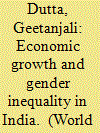

|
|
|
| 2 |
ID:
174557
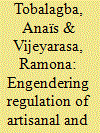

|
|
|
|
|
| Summary/Abstract |
This article argues that adopting a gender perspective when regulating artisanal and small-scale mining (ASM) is both necessary and achievable. The authors analyse women’s often-ignored needs and experiences as workers, decision-makers and affected community members in the ASM sector. To address these concerns, this article sets out standards for regulating ASM to guarantee women’s access to services and information and women’s decision-making and representation; to address the specific risks women face in the sector; and to provide access to effective remedies. The authors use international instruments to identify good practice benchmarks from which legislators and policymakers can draw. The article also notes where global norms fall short of addressing women’s rights in ASM. Some of the limitations of this approach are also acknowledged, notably the challenge of establishing gender-responsive laws that can be feasibly and effectively implemented. Nonetheless, the proposed approach should be favoured to better respond to the highly masculinised nature of the sector and the differentiated impacts of ASM on men and women while recognising women’s roles as beneficiaries and productive agents of the sector.
|
|
|
|
|
|
|
|
|
|
|
|
|
|
|
|
| 3 |
ID:
106292
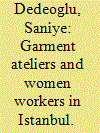

|
|
|
|
|
| Publication |
2011.
|
| Summary/Abstract |
Not only multinational corporations but also small-scale firms are recognized as part and parcel of global commodity production. Most of this production is destined for western economies but not all commodities of industrial production end up in these countries. There is a high volume of trade taking place between developing regions. This article aims to highlight industrial production for the shuttle trade in the Laleli market of Istanbul and the central role that women's and immigrants' labour plays in this production. Garment ateliers producing for the Laleli market are usually operated as family establishments in which tapping into cheap female and immigrant labour through kin networks has been a main form of survival for the ateliers and has generated a successful internationally trading industry.
|
|
|
|
|
|
|
|
|
|
|
|
|
|
|
|
| 4 |
ID:
115257
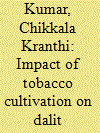

|
|
|
|
|
| Publication |
2012.
|
| Summary/Abstract |
This paper highlights the consequences of the economic and educational change among the Dalits of Karavadi. The tobacco cultivation that engages a large amount of labour has attracted the left political parties for the spread of their ideology and recruitment of party workers. It has helped in working against the practice of untouchability. Further, it has enabled the Dalits to be politically conscious and seriously participate in the political process. The growth of educational institutions in the village and the economic improvement have together helped the Dalits to assert their political and economic rights in the village. As a cumulative effect, the hegemonic inter-caste relations in the village have changed, though caste bias has not disappeared.
|
|
|
|
|
|
|
|
|
|
|
|
|
|
|
|
| 5 |
ID:
126155
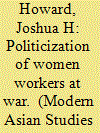

|
|
|
|
|
| Publication |
2013.
|
| Summary/Abstract |
Building on recent scholarship that highlights social change caused by the Anti-Japanese War, this paper traces the politicization of women working in the cotton mills of Chongqing, the Nationalist wartime capital. Upon joining the workforce in the late 1930s, most cotton mill hands were young, uneducated women expected to endure hard work and remain physically confined to the factories. By 1945, women workers were at the forefront of a militant labour movement, writing manifestoes and petitioning government officials. This process of politicization stemmed from their decision to work in factories, which breached societal norms, and their experience of disciplined labour regimes and brutal working conditions, which fostered an incipient class-consciousness. Moreover, Nationalist-sponsored factory education campaigns had the unintended effect of leading women to challenge class exploitation and sexual discrimination. Their participation in the labour movement, which was fuelled by their struggle for economic justice and desire for higher social status, used both legal forms- especially petitions and letters to the press couched in the wartime nationalist rhetoric of shared sacrifice-and extralegal means, namely class violence. The paper concludes that the social changes and conflict that accompanied women's wartime work helped prepare the terrain for Communist rule.
|
|
|
|
|
|
|
|
|
|
|
|
|
|
|
|
| 6 |
ID:
170270
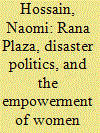

|
|
|
|
|
| Summary/Abstract |
Bangladesh’s garments workers have served as both an emblem of that country’s rapid social and economic progress, and of the precarities of labour in global value chains. Based on an understanding of how disaster politics have played out in Bangladesh’s history, this article explores whether and how the Rana Plaza disaster has been a critical juncture in the politics of the sector, resulting in a shift in power relations that empowers workers to demand and secure their rights. Drawing on a framework developed by Mark Pelling and Kathleen Dill for the analysis of the politics of natural disasters, the article explores the aftermath of the 2013 factory collapse in which 1,134 factory workers were killed. The article examines changes in workers’ own agency and resources, and in their relationships to the state and transnational actors. The article concludes that while the disaster was a turning point in key respects, it has not – unlike previous major disasters in Bangladesh – generated an elite consensus over the priority of workers’ rights and in particular of trade unions. Workers are more empowered than in the past but have yet to fully reverse their historical associational and structural disempowerment.
|
|
|
|
|
|
|
|
|
|
|
|
|
|
|
|
| 7 |
ID:
039229


|
|
|
|
|
| Publication |
Pyongyang, Foreign Lauguages Publishing House, 1975.
|
| Description |
176p.hbk
|
|
|
|
|
|
|
|
|
|
|
|
Copies: C:1/I:0,R:0,Q:0
Circulation
| Accession# | Call# | Current Location | Status | Policy | Location |
| 015758 | 951.9043/T K 015758 | Main | On Shelf | General | |
|
|
|
|
| 8 |
ID:
140837


|
|
|
|
|
| Summary/Abstract |
In 2004, an outbreak of occupational disease in several battery factories in south China led to the cadmium poisoning of hundreds of women workers. Drawing connections between the works of Alfred Schutz and Giorgio Agamben, this article suggests that the lives of cadmium-poisoned victims offer an illustration of the concept of “stranger”, which can be understood as a specific form of “bare life” in contemporary China. Evidence from in-depth interviews and group meetings with dozens of victims revealed not only their physical pain, but also their experience of social estrangement due to a lack of understanding from their significant others and the uphill struggle for compensation. Fieldwork was conducted during the 2010–12 period both in the home villages/towns to which victims had returned and in Guangdong where they stayed behind and fought for their rights. The victims’ experience of sustained estrangement sheds light on contemporary state power that exercises prerogative in silencing the victims rather than enforcing the rule of law.
|
|
|
|
|
|
|
|
|
|
|
|
|
|
|
|
| 9 |
ID:
191701
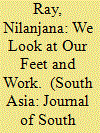

|
|
|
|
|
| Summary/Abstract |
This is a case study of women workers in the informal construction sector who commute daily to the city of Kolkata in eastern India. While existing studies of women construction workers have considered their worker identity as primary, this study offers an alternative theorising, reading them as women whose identity as workers is embedded in other social identities. In-depth interviews with these women reveal that entrenched patriarchal norms and gender discrimination create structural vulnerabilities, which are in turn compounded by the risk of sexual abuse in the workplace. Nevertheless, the women exercise agency and access jobs with favourable wages through bonding and bridging relationships in a sector dominated by men.
|
|
|
|
|
|
|
|
|
|
|
|
|
|
|
|
| 10 |
ID:
117600
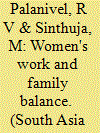

|
|
|
|
|
| Publication |
2012.
|
| Summary/Abstract |
This article aims to assess the ability of formal equal employment opportunity (EEO) programmes and workplace agreement making in India to facilitate work and family balance for women workers. Using documentary analysis and semi-structured interviews in six Indian organisations that are required to develop formal EEO programmes, it is found that formal EEO programmes and agreement making are limited in their ability to promote work and family-friendly arrangements at the workplace. Informal arrangements and managerial discretion remain important in realising work and care balance. The article highlights thus that formal mechanisms alone cannot achieve effective work and care reconciliation for women workers, mainly because they are built upon limited minimum requirements, are voluntary and are dependent upon bargaining processes at the workplace.
|
|
|
|
|
|
|
|
|
|
|
|
|
|
|
|
|
|
|
|
|